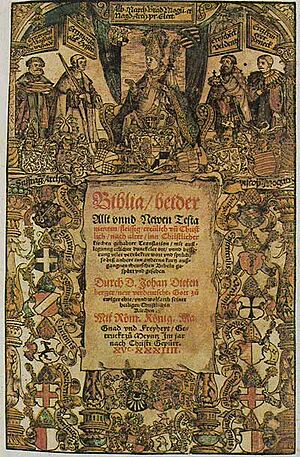Johann Dietenberger facts for kids
Johann Dietenberger (born around 1475 – died September 4, 1537) was an important German scholar and religious leader. He was a member of the Dominican Order, a group of Catholic priests. Dietenberger played a key role during a time of big changes in the Christian church, known as the Counter Reformation. He was also a high-ranking official called an inquisitor-general in the cities of Mainz and Cologne.
Contents
Johann Dietenberger's Life Story
Johann Dietenberger was born in Frankfurt-am-Main, Germany. His father made barrels for a living. Johann went to school in his hometown and later joined the Dominican Order. This was a religious group focused on teaching and preaching.
Becoming a Scholar
In 1510, Dietenberger was chosen to be the prior of his monastery. A prior is like the leader of a religious community. He held this job almost continuously until 1526. In 1511, he went to Cologne to study theology, which is the study of religious beliefs. He learned from famous teachers there.
In 1514, he earned a licentiate degree from the University of Mainz. This is a special degree that allows someone to teach at a university. The next year, in 1515, he earned his doctor's degree. This is the highest degree you can get in a field of study.
Teaching and Leadership
Towards the end of 1517, Dietenberger became a main teacher at Trier. He taught about the writings of Thomas Aquinas, a very important Catholic thinker. He also served as prior in Koblenz for a short time. In 1520, he returned to Frankfurt. There, he became good friends with another important scholar, Johann Cochlaeus.
During the Peasants' War
In 1525, there was a big conflict in Germany called the German Peasants' War. During this time, the city council of Frankfurt took control over the monastery where Dietenberger lived. He resigned from his role as prior, but he had to keep working until October 1526. After that, he left the monastery and went back to Koblenz, where he became prior again until 1532.
The Diet of Augsburg
In 1530, Dietenberger went to the Diet of Augsburg. A "Diet" was a big meeting of important leaders and scholars. At this meeting, twenty Catholic theologians were chosen to write a response to the Augsburg Confession. This was a document that explained the beliefs of the growing Protestant movement. Dietenberger was part of this important group. Around the same time, he was also made the general inquisitor for the dioceses (church areas) of Mainz and Cologne. This meant he had a special role in investigating and judging matters of faith.
Later Years and Bible Translation
From 1532 until his death, Dietenberger taught theology and explained religious texts at the Academy of Mainz. Like Martin Luther, Dietenberger translated the Bible into German. He used recently published Greek and Hebrew Bible texts to help him. However, Dietenberger's translation stayed true to the traditional teachings of the Roman Catholic Church. His German Bible was published in Mainz in 1534. He passed away three years later.
Johann Dietenberger's Important Works
Johann Dietenberger wrote several important books and texts.
His Catechism
One of his key works was a catechism. A catechism is a book that explains the basic teachings of the Christian faith, often in a question-and-answer format. His catechism was called:
- Evangelischer Bericht und Christliche Unterweisung der furnehmlichsten Stuck des waren heyligen Christlichen Glaubens
This book was first published in Mainz in 1537. It was reprinted many times over the years.
His German Bible Translation
Dietenberger's most famous work was his German Bible translation. It was called:
- Biblia beider Allt und Newen Testamenten, new verdeutscht
This Bible was published in Mainz in 1534. It was corrected and updated many times over the years. This translation became known as Die Katholische Bibel (The Catholic Bible) for German-speaking Catholics.
Dietenberger used parts of other Bible translations that existed before the Protestant Reformation. He also looked at the translations by Luther and Leo Jud to make his own translation better.
Other Writings
Dietenberger also wrote fifteen polemical tracts. These were writings that argued strongly for certain religious ideas and against others. They covered topics like the Mass, confession, and religious promises.
 | Madam C. J. Walker |
 | Janet Emerson Bashen |
 | Annie Turnbo Malone |
 | Maggie L. Walker |


